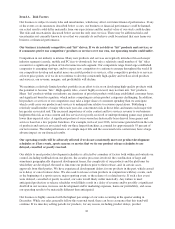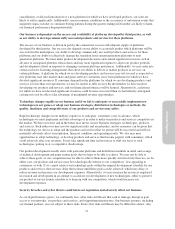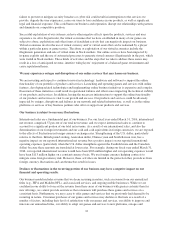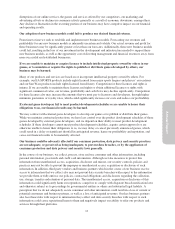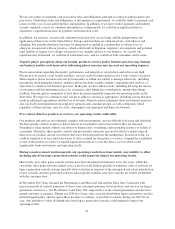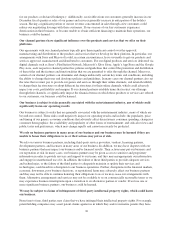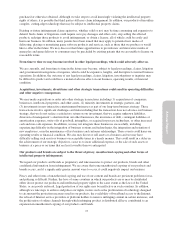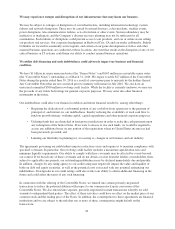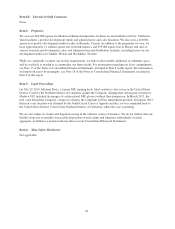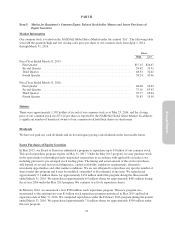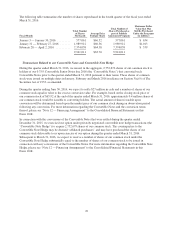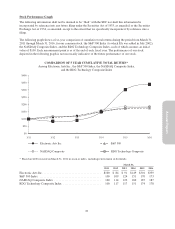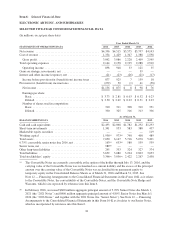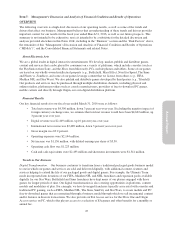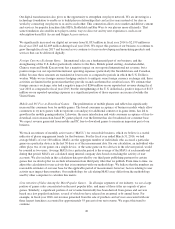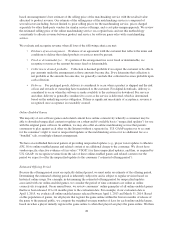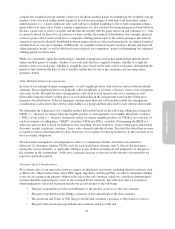Electronic Arts 2016 Annual Report Download - page 105
Download and view the complete annual report
Please find page 105 of the 2016 Electronic Arts annual report below. You can navigate through the pages in the report by either clicking on the pages listed below, or by using the keyword search tool below to find specific information within the annual report.
Annual Report
Changes in our tax rates or exposure to additional tax liabilities could adversely affect our earnings and
financial condition.
We are subject to taxes in the United States and in various foreign jurisdictions. Significant judgment is required
in determining our worldwide income tax provision, tax assets, and accruals for other taxes, and there are many
transactions and calculations where the ultimate tax determination is uncertain. Our effective income tax rate
could be adversely affected by our profit levels, by changes in our business, reorganization of our business and
operating structure, changes in the mix of earnings in countries with differing statutory tax rates, changes in the
elections we make, changes in applicable tax laws, or changes in the valuation allowance for deferred tax assets,
as well as other factors. We are also required to pay taxes other than income taxes, such as payroll, sales, use,
value-added, net worth, property and goods and services taxes, in both the United States and foreign
jurisdictions. Furthermore, we are regularly subject to audit by tax authorities with respect to both income and
such other non-income taxes. Adverse changes in our effective income tax rate, unfavorable audit results or tax
rulings, or other changes resulting in significant additional tax liabilities could have material adverse effects upon
our earnings, cash flows, and financial condition.
Our reported financial results could be adversely affected by changes in financial accounting standards.
Our reported financial results are impacted by the accounting standards promulgated by the SEC and national
accounting standards bodies and the methods, estimates, and judgments that we use in applying our accounting
policies. For example, accounting standards affecting software revenue recognition have affected and could
continue to significantly affect the way we account for revenue and costs related to our products and services. We
recognize all of the revenue from bundled sales (i.e., online-enabled games that include updates on a when-and-
if-available basis or a matchmaking service) on a deferred basis over an estimated offering period. The related
costs of revenues are expensed as incurred instead of deferred and recognized ratably. In May 2014, the FASB
issued ASU 2014-09, Revenue from Contracts with Customers, which will replace existing revenue recognition
guidance in U.S. GAAP when it becomes effective. While we have not yet determined the effect of the new
standard on our Consolidated Financial Statements, we believe the new standard may require us to materially
change the way we account for revenue by requiring us to recognize more revenue upon delivery of the primary
product than we currently do under current accounting standards. The new standard may also require us to
materially change the way we account for related costs by requiring us to capitalize and amortize certain costs
over the period the related assets are transferred to the customer.
As we enhance, expand and diversify our business and product offerings, the application of existing or future
financial accounting standards, particularly those relating to the way we account for revenue, costs and taxes,
could have a significant adverse effect on our reported results although not necessarily on our cash flows.
Our stock price has been volatile and may continue to fluctuate significantly.
The market price of our common stock historically has been, and we expect will continue to be, subject to
significant fluctuations. These fluctuations may be due to factors specific to us (including those discussed in the
risk factors above, as well as others not currently known to us or that we currently do not believe are material), to
changes in securities analysts’ earnings estimates or ratings, to our results or future financial guidance falling
below our expectations and analysts’ and investors’ expectations, to factors affecting the entertainment,
computer, software, Internet, media or electronics industries, to our ability to successfully integrate any
acquisitions we may make, or to national or international economic conditions. In particular, economic
downturns may contribute to the public stock markets experiencing extreme price and trading volume volatility.
These broad market fluctuations have and could continue to adversely affect the market price of our common
stock.
19



